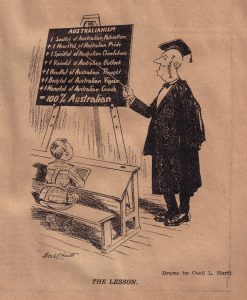[Editor: This article, regarding Australianism, was published in Aussie: The Cheerful Monthly (Sydney, NSW), 15 April 1920. Aussie was originally an Australian Army periodical published in France (Aussie: The Australian Soldiers’ Magazine); when its editor returned home, he recreated it as a civilian publication. The issue of 15 April 1920 was the first copy of Aussie published in Australia.]
Between cobbers.

His highest ideal will be to encourage and guide the Digger to transfer that splendid spirit of comradeship, enthusiasm and patriotism which made the Aussie Army supreme and world-honoured as a fighting organisation into the national life, and make a foundation for the future nation that will make it supreme and honoured among the nations of the world — socially and industrially.
AUSSIE stands for Australianism. Australianism means to give all your physical and moral strength to the advancement of your country, to support its industries, enhance its reputation, build up its future, obey its laws, defend its rights, to put its interests above all others, to give it all your affection and loyalty, and to know only one patriotism — Australian.
AUSSIE wants his cobbers to preserve and develop that splendid Australianism they learnt on the Battlefield, and to teach it to others. Imagine that the Aussie Nation is the Aussie Army. Your State is the Divvie, your suburb or district the Batt. Your Member of Parliament is the Orderly Officer, who is there to receive complaints and see that things are going satisfactorily. Bring before him all matters that will improve your civvie Batt., because that will improve your civvie Divvie, which will improve your civvie Army.
Don’t allow that loyalty and comradeship and national pride that you learnt on the Battlefield to be lost. Sixty thousand of your cobbers died for it, thousands have suffered terribly for it, and many are still suffering and will always suffer for it.
Make your splendid old Esprit de Corps into a still more splendid new Esprit de Nation.
Source:
Aussie: The Cheerful Monthly (Sydney, NSW), 15 April 1920, p. 12
Editor’s notes:
This article was printed opposite the sketch “The Lesson” (p. 13), by Cecil L. Hartt, which was about the idea of Australianism.
Batt. = an abbreviation of “battalion”
civvie = an abbreviation of “civilian”
cobber = friend, mate
Digger = an Australian soldier (a slang word which originated during World War One); in later usage, may also refer to a friend or mate
Divvie = an abbreviation of “Division”
Esprit de Corps = (French) “spirit of the group”; a feeling of group consciousness and pride shared by members of a group, which inspires devotion, enthusiasm and loyalty, especially applied to members of a military unit
Esprit de Nation = “spirit of the nation” (a variation of the French phrase “esprit de corps”, meaning “spirit of the group”)
Leave a Reply